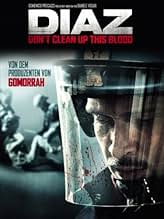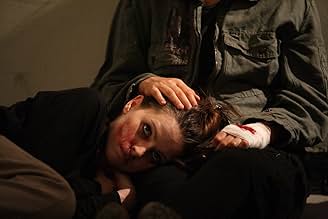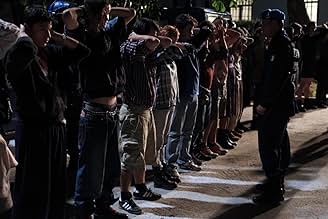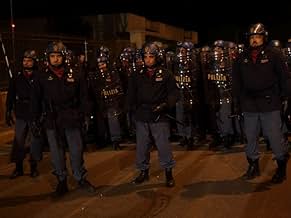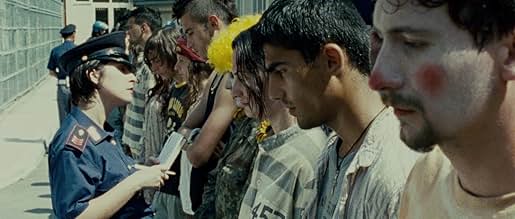VALUTAZIONE IMDb
7,3/10
4146
LA TUA VALUTAZIONE
Una rievocazione degli ultimi giorni del vertice del G8 del 2001.Una rievocazione degli ultimi giorni del vertice del G8 del 2001.Una rievocazione degli ultimi giorni del vertice del G8 del 2001.
- Regia
- Sceneggiatura
- Star
- Premi
- 15 vittorie e 23 candidature totali
Recensioni in evidenza
A KVIFF viewing, an Italian film from director Daniele Vicari, the film undertakes a sticky task to recount the fierce police assault on the so-called black-bloc group (mostly foreigners, students, journalists) after some protesters' affray in the final days of 2001 G8 Summit in Genova.
The film's chief characteristic is its visual language, shockingly bold and deadly savage, which inevitably will be shunned by the demography of those are intolerable of graphic violence. One must admit, we are now in the era where news generally fade away in a 48-hour rotation, there are myriads of mostly recent "unfortunate incidents" have been erased from our mind, so as to this film takes a quite extreme measurement to remind us such horrifying and atrocious events did actually exist only a decade ago in a developed western country, with government authorities holding the reins.
The very first scene, is a backward slow-motion of a protester slinging an empty bottle toward the police vehicles which are deliberately passing by the area, in order to procure a professed pretext to carry out the subsequent battery, so allegedly the entire action is ruthlessly plotted to set an example and to hector the masses. Two-thumbs up to the valor of the film, which fearlessly exposes the dark side of the government and the powerlessness of individual. But when the said slow-motion has been exploited multiple times, a dwindling impact inexorably occurs each time it recurs.
Due to the fact the approach of depicting this scandalizing event in a multi-reflective manner, it entails a wide range of characters, local volunteers, various foreigners (among those are many innocent victims and the real peace-breakers who ironically evade the brute force), policemen who execute the operation, The numerous cast diffuses one's concentration while most roles are underwritten and loosely connected or fragmented, nevertheless Jennifer Ulrich gives a gutsy impression as a victim traumatized both outside and inside, Claudio Santamaria, also stands out among the bulk of cast, as the righteous Italian policeman who is more of a reluctant witness than a government's henchman or heavy.
Anyway, with excellent editing, sound effects and a steady camera eye, the film is a quite mature work, on which one definitely could ruminate and alert oneself to be more conscious of the tragic happenings, they are just around us, be wise and be careful.
The film's chief characteristic is its visual language, shockingly bold and deadly savage, which inevitably will be shunned by the demography of those are intolerable of graphic violence. One must admit, we are now in the era where news generally fade away in a 48-hour rotation, there are myriads of mostly recent "unfortunate incidents" have been erased from our mind, so as to this film takes a quite extreme measurement to remind us such horrifying and atrocious events did actually exist only a decade ago in a developed western country, with government authorities holding the reins.
The very first scene, is a backward slow-motion of a protester slinging an empty bottle toward the police vehicles which are deliberately passing by the area, in order to procure a professed pretext to carry out the subsequent battery, so allegedly the entire action is ruthlessly plotted to set an example and to hector the masses. Two-thumbs up to the valor of the film, which fearlessly exposes the dark side of the government and the powerlessness of individual. But when the said slow-motion has been exploited multiple times, a dwindling impact inexorably occurs each time it recurs.
Due to the fact the approach of depicting this scandalizing event in a multi-reflective manner, it entails a wide range of characters, local volunteers, various foreigners (among those are many innocent victims and the real peace-breakers who ironically evade the brute force), policemen who execute the operation, The numerous cast diffuses one's concentration while most roles are underwritten and loosely connected or fragmented, nevertheless Jennifer Ulrich gives a gutsy impression as a victim traumatized both outside and inside, Claudio Santamaria, also stands out among the bulk of cast, as the righteous Italian policeman who is more of a reluctant witness than a government's henchman or heavy.
Anyway, with excellent editing, sound effects and a steady camera eye, the film is a quite mature work, on which one definitely could ruminate and alert oneself to be more conscious of the tragic happenings, they are just around us, be wise and be careful.
In July of 2001, over 200.000 people took to the streets of Genoa in protest against a meeting of the G8 - the group of the worlds' eight most powerful industrial countries whose summit decisions were to have a global impact on the world. In the aftermath of the protest, there were hundreds of injured, and 23-year-old activist Carlo Giuliani was killed when he confronted a Carabinieri vehicle. He was shot with a firearm and was ran over twice by a police Land Rover.
Day after this big anti-globalist protests in Genoa, the police organized a night raid on the Diaz school, where the temporary headquarters of the Genoa Social Forum was located, alongside with Indymedia - an independent media organization, as well as activist lawyers who provided free legal services to protest participants and collected documentation on the police brutality during the protests. At the moment when 500 members of the police and carabinieri stormed the building, there were around one hundred people sleeping inside, among them many journalists and young people who came from different European countries to take part in the protest.
The film relies on documentary material and depicts these events extremely realistically, especially the atrocious police beating of everyone they came across in the building, seriously wounding many people, causing some to sustain life-critical injuries and even coma. Those who did not end up on the life support in the hospital were arrested and transferred to a police barracks where they were abused and brutally tortured for several more days.
In addition to extreme brutality against activists, police destroyed a large amount of computer and media equipment, took all hard drives and destroyed all cameras they found in the building. After that, police officers went on to set up a false evidence campaign aiming to present this school as a black block stronghold, as well as an improvised hospital for people with existing injuries from the protests.
It is important to understand that this attack wasn't accidental in any way. It was planned at the highest levels of police and government. Besides destroying computer equipment and evidence against the police, the goal was to criminalize the movement and instigate a media lynching, but also to deeply traumatize a large number of activists and thus passivize or break the protest movement.
The gruesome police violence during the Diaz raid that is presented can be compared with the cult film "The Strawberry Statement", which covers the Columbia University protests of 1968 and the brutal intervention of the US Police and National Guard.
Particularly interesting is the fact that afterward no police officer was tried for torture, because in 2001 the Italian law did not recognize torture as a criminal offense. Movie scenes of humiliation and torture that took place after the transfer of the arrestees into the police barracks are irresistibly reminiscent of films about military-fascist dictatorships in Latin America. It's the same politics, the same method, the same interests.
This film should be a kind of a lesson to anyone involved in any protest or social movements. Know what to expect if a protest actually jeopardizes someone's interests - in the sense that every social conflict is part of the struggle between social classes. Although this struggle is mainly of low intensity, contended to individual strikes and protests, if a movement actually threatens the interests of the ruling class, the conflict will soon turn into a class war in which the ruling class won't choose the means, nor heed to victims.
It is therefore crucial to understand the class nature of the society we live in, and the implications it has. One certainly shouldn't be naive and think that the state and the police have anything to do with law or justice.
Day after this big anti-globalist protests in Genoa, the police organized a night raid on the Diaz school, where the temporary headquarters of the Genoa Social Forum was located, alongside with Indymedia - an independent media organization, as well as activist lawyers who provided free legal services to protest participants and collected documentation on the police brutality during the protests. At the moment when 500 members of the police and carabinieri stormed the building, there were around one hundred people sleeping inside, among them many journalists and young people who came from different European countries to take part in the protest.
The film relies on documentary material and depicts these events extremely realistically, especially the atrocious police beating of everyone they came across in the building, seriously wounding many people, causing some to sustain life-critical injuries and even coma. Those who did not end up on the life support in the hospital were arrested and transferred to a police barracks where they were abused and brutally tortured for several more days.
In addition to extreme brutality against activists, police destroyed a large amount of computer and media equipment, took all hard drives and destroyed all cameras they found in the building. After that, police officers went on to set up a false evidence campaign aiming to present this school as a black block stronghold, as well as an improvised hospital for people with existing injuries from the protests.
It is important to understand that this attack wasn't accidental in any way. It was planned at the highest levels of police and government. Besides destroying computer equipment and evidence against the police, the goal was to criminalize the movement and instigate a media lynching, but also to deeply traumatize a large number of activists and thus passivize or break the protest movement.
The gruesome police violence during the Diaz raid that is presented can be compared with the cult film "The Strawberry Statement", which covers the Columbia University protests of 1968 and the brutal intervention of the US Police and National Guard.
Particularly interesting is the fact that afterward no police officer was tried for torture, because in 2001 the Italian law did not recognize torture as a criminal offense. Movie scenes of humiliation and torture that took place after the transfer of the arrestees into the police barracks are irresistibly reminiscent of films about military-fascist dictatorships in Latin America. It's the same politics, the same method, the same interests.
This film should be a kind of a lesson to anyone involved in any protest or social movements. Know what to expect if a protest actually jeopardizes someone's interests - in the sense that every social conflict is part of the struggle between social classes. Although this struggle is mainly of low intensity, contended to individual strikes and protests, if a movement actually threatens the interests of the ruling class, the conflict will soon turn into a class war in which the ruling class won't choose the means, nor heed to victims.
It is therefore crucial to understand the class nature of the society we live in, and the implications it has. One certainly shouldn't be naive and think that the state and the police have anything to do with law or justice.
Seriously. I walked out of it somewhat disorientated and still shaken. I saw 'Diaz - Don't clean up this Blood' about a month ago at its Berlinale Screening and it still haunts me. I could tell that most of the audience shared my feelings and some even left the cinema, because they couldn't bear what they were seeing. Nevertheless the applause was extraordinary.
We have all seen our fair share of violence and cruelty in the movies. But this is a completely different pair of shoes. The non-fictional background of the film plot concerns me personally, both as a human being and as an European citizen. It's hard to imagine this happened ten years ago in a Western European country and yet it DID happen and it could - and probably will - happen again. That's why it is so important to deal with the topic of police violence instead of ignoring it or playing it down. The film crew and cast did a great job capturing the horror of this disastrous event. And that's what 'Diaz' mainly seems to be about: re-creating and contextualizing the occurred violations of human rights in 2001 in Italy as authentic and accurate as it can be done in a feature film.
It obviously wants you to be shocked, but with good reasons: it describes shocking incidents, which should not be trivialized. If you do some research, you'll find out that the film indeed does not exaggerate anything. But it does NOT inform you about the political background, you have to inform yourself. And I think you will, after you've seen it.
'Diaz' is not entirely flawless, but it could be a film of great significance, provided that it motivates the audience to read up on the subject.
If you're interested in a less gripping, but much more informative approach on the matter, check out the documentary "The Summit" (2012).
We have all seen our fair share of violence and cruelty in the movies. But this is a completely different pair of shoes. The non-fictional background of the film plot concerns me personally, both as a human being and as an European citizen. It's hard to imagine this happened ten years ago in a Western European country and yet it DID happen and it could - and probably will - happen again. That's why it is so important to deal with the topic of police violence instead of ignoring it or playing it down. The film crew and cast did a great job capturing the horror of this disastrous event. And that's what 'Diaz' mainly seems to be about: re-creating and contextualizing the occurred violations of human rights in 2001 in Italy as authentic and accurate as it can be done in a feature film.
It obviously wants you to be shocked, but with good reasons: it describes shocking incidents, which should not be trivialized. If you do some research, you'll find out that the film indeed does not exaggerate anything. But it does NOT inform you about the political background, you have to inform yourself. And I think you will, after you've seen it.
'Diaz' is not entirely flawless, but it could be a film of great significance, provided that it motivates the audience to read up on the subject.
If you're interested in a less gripping, but much more informative approach on the matter, check out the documentary "The Summit" (2012).
When you ever wished you had participated in a happy leftie mass event - watch that movie. The camera gave me the whole time the feeling of being part of the crowd on the screen, just there in the school building, between all the funny people - the guy who plays flamenco guitar, some Manu Chao song, the pop-up band, people just dancing - all of them who want to make the world a better place. A lot of languages are used all over the movie, people act like like real people do, it's just fine. This is the first part. Everything afterward, as we know, is of extreme brutality, and I was happy that I had never been part in that leftie mass event. I really liked the movie how it was make, technically. It's only a pity that a lot of answers are not given. It would have been helpful to work out more of the backgrounds. The extreme force of the police, where did it come from? There must have been a lot of hate and fear a long time in advance. We don't get to know much about the really violent left wing and how far the police was able or willing to make a difference between them and the average wild-haired, guitar-playing and further peaceful demonstrators. So, I missed some different points of view besides just the picture of peaceful lefties. But when you realize that everything really has happened like this, the the world is maybe less subtle some times. And that makes me shiver.
The film "Diaz – Don't clear up the blood" had its world premiere in Berlin, as part of the Berlinale 2012 film festival, in front of a full house with an estimated 1,750 viewers. The screening ended with an overwhelming applause, that lasted for an unusual long time. A considerable part of those involved in making this film was present. In his introduction the director mentioned that several victims of the raid were among them. He admired their preparedness to relive the dire event.
The film title has two parts. The first (Diaz) part refers to the name of the school where the raid took place. The police thinks it is a nest full of "black bloc", allegedly being the core of demonstrations around the G8 summit in 2001 in Genoa (Italy). The second (Don't clean...) part refers to a hand made sign that was written on the wall after the raid, actually asking to keep intact what was left behind. That included large blood stains all over floors and walls, very useful as indisputable contradictory statement against the police PR.
A clever scenario circles around what happened, rather than treating events chronologically. An important feature of the film is that we were introduced to miscellaneous persons having specific roles later on. This served as a binding element, elevating the film above a simple documentary. As the director said: due to these minor roles, you better remember the events afterwards. We see for example an elderly tourist, who got detached from his bus tour and was only looking for a place to sleep. Another example is a journalist from a right-wing magazine, taking leave to report from the inside out. Many more such personal stories develop along the line, working out exactly as the director mentioned.
We were also offered an impression how average policemen stand in this. The tone is set in a scene where we see how a police car gets lost in some neighborhood they better stay out. They are immediately surrounded by angry citizens calling them "murderers", the result of a recent event where one person was killed in the course of a demonstration. The policemen feel threatened but escape unharmed.
Also from a law enforcement viewpoint, but on a different level, we observe several decision makers (district attorney, police commanders, city council, etc). They had to depend on biased reports from police officers, finally deciding to proceed on very weak grounds, but "we must do something". Various evidence was planted to support their decision, or declared solid evidence later on. Benign empty bottles were allegedly stocked there for making Molotov cocktails. The PR aftermath from the police was evidently biased too, Best example were remarks about prepared wounds, said to have already existed before the raid, with express intent to blame the police later on. Of course, speaking of obvious bias is easy for us to say; we had ample chance to see the general picture from both sides.
The actual raid is visualized in full force, about halfway the two hours running time. What we see before and after this core scene, continuously circles around it by showing whereabouts of victims and bystanders, and how they got involved. All are clearly innocent of the bad things the police attributed to them. They all happened to be at the wrong place at the wrong time. These personal stories, however small and trivial in the context of what is happening, work very well to elevate this film above a dry documentary that only states facts.
I could not help wondering how useful it is to show the raid in every nasty detail. One important reason is that pictures speak one thousand words. We can expect the impact on the average viewer to be much greater than only words. A second reason could be that the film clearly shows the needlessly exaggerated amount of police power put into force, just for a relatively small unarmed group. A perfect illustration was the scene were everyone was standing with hands above their heads, apparently believing that an explicit show of being unarmed and defenseless would suffice, but the police bulldozed over them regardless.
We witnessed a meeting of city council and law enforcement decision makers, giving a clear insight how it could come that far. The proof that lefties (not my words) were gathering was very thin (long hair, hoodies, what further proof do we need?). Also noteworthy was a statement from the police commander that he would be unable to control his men once in action. After that we saw a rather sketchy briefing for the policemen in the field, merely amplifying already dormant feelings that Diaz housed very illegal, near-terrorist actions. After such a biased preparation the heavily visualized police brutality within Diaz becomes a bit more understandable. The instructions to the policemen conveyed an image of illegality, with adversaries determined to plan demonstrations and other unlawful actions.
Part of the final credits were some statistics about policemen and other officials convicted for involvement in the action. That is how "the system" works, but I'm certain it took years to come to final convictions. And above all, it leaves us with doubts whether it will improve future decision making. And last but not least, it won't repair the (internal and external) wounds of the victims having to live on with the consequences.
All in all, an impressive document about the raid, providing very useful insights in what happened before and after. The various personal stories bring it to a much higher level than just a documentary. Also very interesting is that we see both sides, and the mechanisms involved how things like this get out of control.
The film title has two parts. The first (Diaz) part refers to the name of the school where the raid took place. The police thinks it is a nest full of "black bloc", allegedly being the core of demonstrations around the G8 summit in 2001 in Genoa (Italy). The second (Don't clean...) part refers to a hand made sign that was written on the wall after the raid, actually asking to keep intact what was left behind. That included large blood stains all over floors and walls, very useful as indisputable contradictory statement against the police PR.
A clever scenario circles around what happened, rather than treating events chronologically. An important feature of the film is that we were introduced to miscellaneous persons having specific roles later on. This served as a binding element, elevating the film above a simple documentary. As the director said: due to these minor roles, you better remember the events afterwards. We see for example an elderly tourist, who got detached from his bus tour and was only looking for a place to sleep. Another example is a journalist from a right-wing magazine, taking leave to report from the inside out. Many more such personal stories develop along the line, working out exactly as the director mentioned.
We were also offered an impression how average policemen stand in this. The tone is set in a scene where we see how a police car gets lost in some neighborhood they better stay out. They are immediately surrounded by angry citizens calling them "murderers", the result of a recent event where one person was killed in the course of a demonstration. The policemen feel threatened but escape unharmed.
Also from a law enforcement viewpoint, but on a different level, we observe several decision makers (district attorney, police commanders, city council, etc). They had to depend on biased reports from police officers, finally deciding to proceed on very weak grounds, but "we must do something". Various evidence was planted to support their decision, or declared solid evidence later on. Benign empty bottles were allegedly stocked there for making Molotov cocktails. The PR aftermath from the police was evidently biased too, Best example were remarks about prepared wounds, said to have already existed before the raid, with express intent to blame the police later on. Of course, speaking of obvious bias is easy for us to say; we had ample chance to see the general picture from both sides.
The actual raid is visualized in full force, about halfway the two hours running time. What we see before and after this core scene, continuously circles around it by showing whereabouts of victims and bystanders, and how they got involved. All are clearly innocent of the bad things the police attributed to them. They all happened to be at the wrong place at the wrong time. These personal stories, however small and trivial in the context of what is happening, work very well to elevate this film above a dry documentary that only states facts.
I could not help wondering how useful it is to show the raid in every nasty detail. One important reason is that pictures speak one thousand words. We can expect the impact on the average viewer to be much greater than only words. A second reason could be that the film clearly shows the needlessly exaggerated amount of police power put into force, just for a relatively small unarmed group. A perfect illustration was the scene were everyone was standing with hands above their heads, apparently believing that an explicit show of being unarmed and defenseless would suffice, but the police bulldozed over them regardless.
We witnessed a meeting of city council and law enforcement decision makers, giving a clear insight how it could come that far. The proof that lefties (not my words) were gathering was very thin (long hair, hoodies, what further proof do we need?). Also noteworthy was a statement from the police commander that he would be unable to control his men once in action. After that we saw a rather sketchy briefing for the policemen in the field, merely amplifying already dormant feelings that Diaz housed very illegal, near-terrorist actions. After such a biased preparation the heavily visualized police brutality within Diaz becomes a bit more understandable. The instructions to the policemen conveyed an image of illegality, with adversaries determined to plan demonstrations and other unlawful actions.
Part of the final credits were some statistics about policemen and other officials convicted for involvement in the action. That is how "the system" works, but I'm certain it took years to come to final convictions. And above all, it leaves us with doubts whether it will improve future decision making. And last but not least, it won't repair the (internal and external) wounds of the victims having to live on with the consequences.
All in all, an impressive document about the raid, providing very useful insights in what happened before and after. The various personal stories bring it to a much higher level than just a documentary. Also very interesting is that we see both sides, and the mechanisms involved how things like this get out of control.
Lo sapevi?
- QuizDirector Daniele Vicari watched 700 hours of video footage for research.
- Colonne sonoreEvolution, Revolution, Love
Performed by Tricky
I più visti
Accedi per valutare e creare un elenco di titoli salvati per ottenere consigli personalizzati
- How long is Diaz - Don't Clean Up This Blood?Powered by Alexa
Dettagli
- Data di uscita
- Paesi di origine
- Sito ufficiale
- Lingue
- Celebre anche come
- Diaz
- Luoghi delle riprese
- Aziende produttrici
- Vedi altri crediti dell’azienda su IMDbPro
Botteghino
- Budget
- 6.453.637 € (previsto)
- Lordo in tutto il mondo
- 2.621.201 USD
- Tempo di esecuzione2 ore 7 minuti
- Colore
- Proporzioni
- 2.35 : 1
Contribuisci a questa pagina
Suggerisci una modifica o aggiungi i contenuti mancanti

Divario superiore
By what name was Diaz - Don't Clean Up This Blood (2012) officially released in Canada in English?
Rispondi
